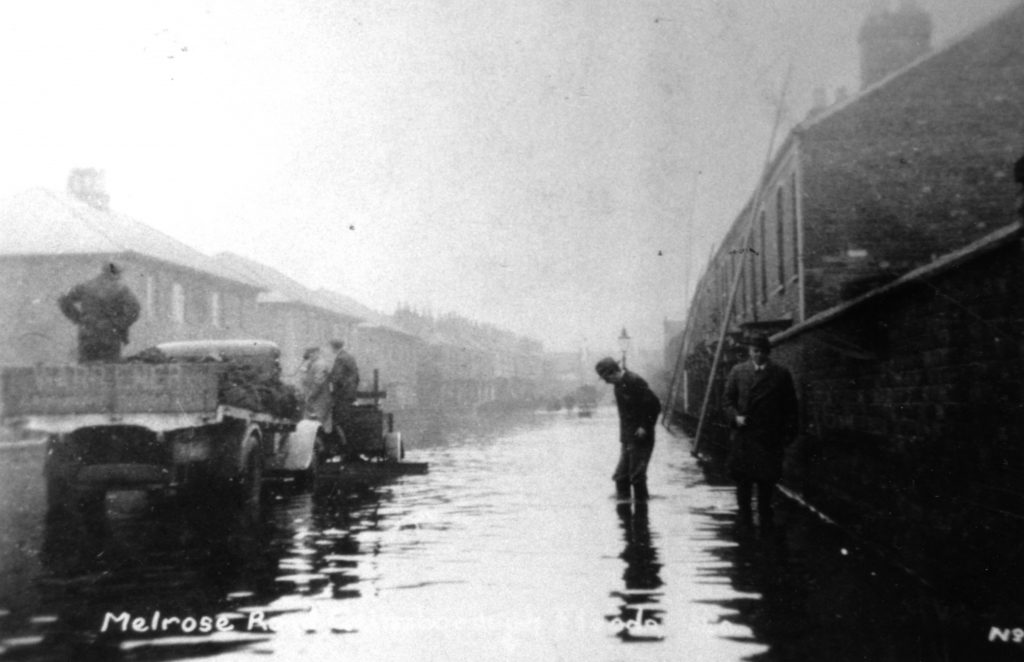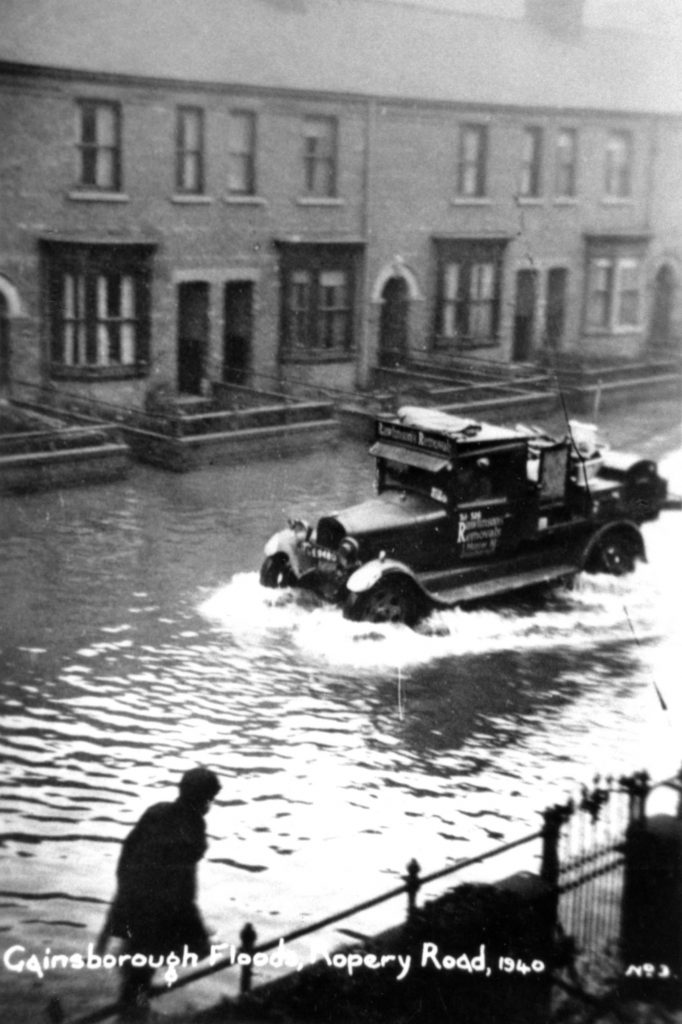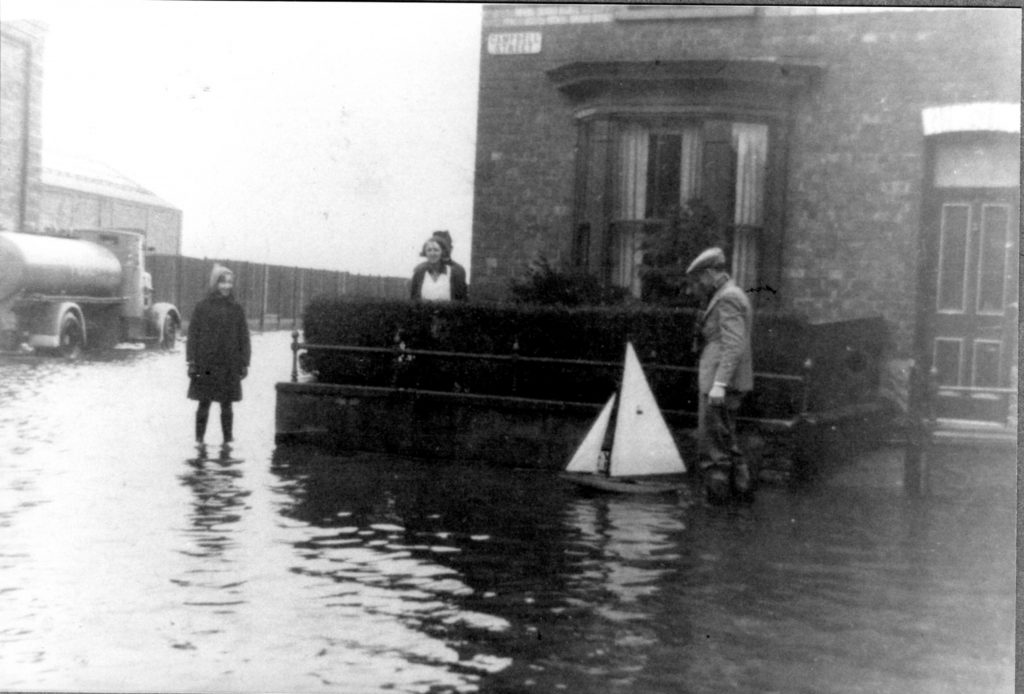Reported in the Gainsborough News on the 8th March 1940 was the story of how the worst damage in the Gainsborough Floods of that year were sustained by the residents of Melrose Road, North Marsh Road and Mowbray Street, a low lying district within the town which was built on the old flood plain.
It was Monday afternoon when the residents of these areas were taken by surprise when a wall of water came crashing through an opening between the new and old houses situated on the south side of Melrose Road. The water had come from the Love Lane area of the town sweeping across the allotments that are still there today, and across the field known as Clark’s Field flooding numerous houses within minutes of it appearing.
Mr. E Curtis a musician who lived in one of the newer built houses of Melrose Road that was not so badly affected reported at the time:-
“I came home about noon on Monday, and against this opening between the houses I heard a great roaring noise. It was a great wall of water and I had difficulty in holding my feet, so strong was the current. I had to hang on to the railings. The water, carrying all sorts of flotsam with it swirled into the street. I got to my house and started to take up the carpets and furniture. Within a few minutes there was nearly a foot of water. The water rushed into the houses opposite my house like a waterfall, because they are much lower and, apparently it swept through the Constitutional Branch Club, over their bowling green into North Marsh Road and flooded their houses. I have never seen anything like it.”

Nor had the other residents, some of the houses on Melrose Road were flooded to a depth of four and five feet. The flood water ruined their homes, and not merely their furniture but it destroyed household goods that were in cupboards and pantries.
When the floods struck most of the men were at work and the women were helpless against the onslaught of the water. People who were living in the low lying houses that were close to this opening saw the whole tragedy and to these people it was a tragedy, losing most of their possessions. The first house near the opening was at the time occupied by a Mr. A Cave and his family. A butcher by trade Mr. Cave had a shop at the front of the premises, when the surge of water came he was out but he had left a handcart full of meat in the lane along which the water swept. Mrs. Cave who was preparing the family dinner reported the following:-
“In a minute or two there was over a foot of water in the house and I tried to save what I could. The water entered by the back door, filled the kitchen, and there was a foot in the dining room in no time”.
Another resident a Mr. C Borrill who lived next door, was at the time off work as Newsums were he was employed at the southern end of the town was also flooded. He had just gone off to see the floods elsewhere in the town when the wall of water arrived at his own back door. His wife had seen the water coming down a passage at the rear of their house and had tried to dam the gate. Of course it was an attempt in vain and Mrs. Borrill later reported the following:-
“I heard a roaring noise, and saw a horrible wall of black water coming up the lane. It was like the ‘Aegir’ and made a terrible noise. I ran inside, tried to catch up a few things in the scullery, but it swirled inside. I tried to save some of the furniture, but the water entered so quickly that there were soon two feet in the dining room, which is much higher than the scullery. I screamed. It went into the front room and soon everything was afloat. I saw the rain tub go floating out the back yard, and when I next saw it, it was in the front garden with Mrs. Cave’ kettle.”
The flood water arrived with such ferocity that considerable damage was done to property in this district, and many people lost half of their home and possessions. These people were marooned within their own homes, essential supplies such as food, water and coal had to be taken to them in their upstairs rooms by the means of boat, raft and ladders raised up to bedroom windows. The stranded residents making use of the tops of the bay windows to store the bags of coal, the ladders and transport delivering these goods can clearly be seen in the picture above.
Everything possible was done to make life bearable; Mr. Borrill who had remained off work for several days served the street in a pair of borrowed waders as carrier, postman, coalman and milkman. And shortly after the flood arrived was involved along with several other neighbours in rescuing eight pigs belonging to a Mr. William Lockwood who lived further up the street. The pigs resided in premises at the back of Mr Borrill’s house.
“It was a difficult job getting the pigs out of the water, but we managed to get them away on Mr. Cave’s handcart and on a milk float. We got wet through to the skin because the pigs were a bit unruly.” He later joked.
The local police also got involved in the assistance of the area, headed up by Inspector Watson, a Sergeant Lee and PC Epton acquired a door and some posts from the local builders yard Messrs Pumfrey at the rear of Melrose Road which was also under water and with this made a raft. They then proceeded from door to door on the raft helping the families to move their furniture, taking them groceries and provisions and anything else they may be called upon in these times of trial. A Miss Liversidge who lived in one of the new houses, said that the Police had been magnificent.
In another instance of assisting their fellow man, the town Sanitary inspector Mr. W W Jackson after being told by the Council to do whatever he needed to do to alleviate the situation in the worst hit area, sought out some help from the Gainsborough Rowing Club.
“I sought the help of the Rowing Club for a boat, and I found two very willing helpers in Mr. H Surfleet and Mr. F Keightley. They got a boat to the scene, and throughout one afternoon they and myself helped to take coal to the houses and deliver food and necessities to people who were living in their bedrooms and could not get to their coal places because of the water, nor to their pantries or water taps.”
Mr. Keightley had reported that they had sailed the boat down the Trent and over the bank at Bowling Green Lane where they stopped at Marshall’s while they had some food.
“We got the boat there and sailed down Ropery Road, down Love Lane and across the allotments. There we came to a full stop, but we got a handcart, took it round Albany Street and back to the flooded area. Yes, we did some good work that afternoon.”

Nor had the other residents, some of the houses on Melrose Road were flooded to a depth of four and five feet. The flood water ruined their homes, and not merely their furniture but it destroyed household goods that were in cupboards and pantries.
When the floods struck most of the men were at work and the women were helpless against the onslaught of the water. People who were living in the low lying houses that were close to this opening saw the whole tragedy and to these people it was a tragedy, losing most of their possessions. The first house near the opening was at the time occupied by a Mr. A Cave and his family. A butcher by trade Mr. Cave had a shop at the front of the premises, when the surge of water came he was out but he had left a handcart full of meat in the lane along which the water swept. Mrs. Cave who was preparing the family dinner reported the following:-
“In a minute or two there was over a foot of water in the house and I tried to save what I could. The water entered by the back door, filled the kitchen, and there was a foot in the dining room in no time”.
Another resident a Mr. C Borrill who lived next door, was at the time off work as Newsums were he was employed at the southern end of the town was also flooded. He had just gone off to see the floods elsewhere in the town when the wall of water arrived at his own back door. His wife had seen the water coming down a passage at the rear of their house and had tried to dam the gate. Of course it was an attempt in vain and Mrs. Borrill later reported the following:-
“I heard a roaring noise, and saw a horrible wall of black water coming up the lane. It was like the ‘Aegir’ and made a terrible noise. I ran inside, tried to catch up a few things in the scullery, but it swirled inside. I tried to save some of the furniture, but the water entered so quickly that there were soon two feet in the dining room, which is much higher than the scullery. I screamed. It went into the front room and soon everything was afloat. I saw the rain tub go floating out the back yard, and when I next saw it, it was in the front garden with Mrs. Cave’ kettle.”
The flood water arrived with such ferocity that considerable damage was done to property in this district, and many people lost half of their home and possessions. These people were marooned within their own homes, essential supplies such as food, water and coal had to be taken to them in their upstairs rooms by the means of boat, raft and ladders raised up to bedroom windows. The stranded residents making use of the tops of the bay windows to store the bags of coal, the ladders and transport delivering these goods can clearly be seen in the picture above.
Everything possible was done to make life bearable; Mr. Borrill who had remained off work for several days served the street in a pair of borrowed waders as carrier, postman, coalman and milkman. And shortly after the flood arrived was involved along with several other neighbours in rescuing eight pigs belonging to a Mr. William Lockwood who lived further up the street. The pigs resided in premises at the back of Mr Borrill’s house.
“It was a difficult job getting the pigs out of the water, but we managed to get them away on Mr. Cave’s handcart and on a milk float. We got wet through to the skin because the pigs were a bit unruly.” He later joked.
The local police also got involved in the assistance of the area, headed up by Inspector Watson, a Sergeant Lee and PC Epton acquired a door and some posts from the local builders yard Messrs Pumfrey at the rear of Melrose Road which was also under water and with this made a raft. They then proceeded from door to door on the raft helping the families to move their furniture, taking them groceries and provisions and anything else they may be called upon in these times of trial. A Miss Liversidge who lived in one of the new houses, said that the Police had been magnificent.
In another instance of assisting their fellow man, the town Sanitary inspector Mr. W W Jackson after being told by the Council to do whatever he needed to do to alleviate the situation in the worst hit area, sought out some help from the Gainsborough Rowing Club.
“I sought the help of the Rowing Club for a boat, and I found two very willing helpers in Mr. H Surfleet and Mr. F Keightley. They got a boat to the scene, and throughout one afternoon they and myself helped to take coal to the houses and deliver food and necessities to people who were living in their bedrooms and could not get to their coal places because of the water, nor to their pantries or water taps.”
Mr. Keightley had reported that they had sailed the boat down the Trent and over the bank at Bowling Green Lane where they stopped at Marshall’s while they had some food.
“We got the boat there and sailed down Ropery Road, down Love Lane and across the allotments. There we came to a full stop, but we got a handcart, took it round Albany Street and back to the flooded area. Yes, we did some good work that afternoon.”
One of the worst hit properties of the area was the General Shop of Melrose Road owned by Mr. T Neale, the water having rushed from the opening across the road damaged three months supply of washing powders etc; that had just been delivered into the shop. The water as elsewhere raged through the shop into the dining room and kitchen doing considerable damage to the furniture household belongings and a number of valuable books. The houses next door suffered a similar fate and as was mentioned earlier the Constitutional Club also had a surprise visitation.
The steward of the time Mr. H Wright takes up the story:-
“It was about dinner time and there were one or two customers in. The water came pouring into the club, where members were playing dominoes, and they had not time to get out. They hopped on to spittoons and then on to the long saddles, and they were marooned until 5-30, when they were ‘pagged’ out. We closed down then and went to our house, which adjoins, but it was badly flooded. We had to live upstairs and we had not a bite or anything to drink until Inspector Watson found us 24 hours later, because we could not attract anybody’s attention. A lot of our furniture is absolutely ruined”.
There were several other sad stories told through the news item of the Epic of Melrose Road, in a row of about ten houses in the lowest lying part of the street, two of the couples were newlyweds, their homes being described as “little palaces”. The two couples Mr. and Mrs. Daubney and Mr. and Mrs. A Brightman lost practically everything. A Mr. and Mrs. Davey who had just given birth to a child, the child having to be wrapped in cotton wool for several days and could not be moved. The family had to be accommodated in their bedroom until it was safe for them to be evacuated.
Another story from Melrose Road was that of Mrs. C Good who through invalidity had been sleeping in a downstairs room. She was quickly moved upstairs in an armchair when the floods arrived. Mrs. Good was removed by police the following day, when they had to lower her on a stretcher down a ladder to waiting policemen waist deep in water carried her to the waiting ambulance.
All of the inhabitants of this district could tell heart rending stories, but probably the most heart rending of all was that at its height a funeral took place form one of the flooded homes after a six year old child had died.
But despite all of the heartache and damage the British spirit shone through, the town recovered and families and life went on.

